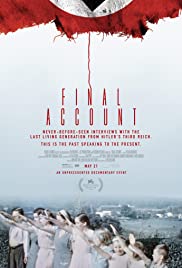
FINAL ACCOUNT
UK/US, 2020, 94 minutes, Colour/black and white.
Directed by Luke Holland.
A documentary about the Holocaust – but not interviews with survivors and their families. Rather, this is a series of interviews with, mainly men, who were members of the SS or who were concentration camp guards. At the time of filming and the interviews, they are in their 80s. They are Germans and Austrians.
The director of the film, Luke Holland, who had family in Auschwitz, decided to do these interviews, to ask these SS and guard survivors about their attitudes of the time, motivations for joining the SS, the effect on them and their lives, their knowledge of what was going on, their allegiance to the Nazi party, the imprisonment and execution of the Jews.
The film is something of a jigsaw, the intercutting of the various interviews, the questions by the director, offscreen. There is also a special sequence, somewhat alarming as we listen to the questions and discussions, the presence of one of the veterans and his being targeted and his response. The conversation is staged in the house in Wannsee, the site of the meeting to discuss the Final Solution.
The speakers are quite open in their responses. The men were members of the SS, considering it an elite, members of other groups with special training. They remember that as children they were forever wearing uniforms, that their attitudes of loyalty to the Fatherland the part and parcel of their lives. They were selected when young, sent to special training, given documents, proud of their elite status and their Aryan blood. The women, on the other hand, who interviewed served in minor roles or in account and offices on the site to the camps.
The film lists the major concentration camps, films and the remaining buildings, office statistics of what happened in those camps.
The cumulative effect of listening to these men, many admitting the shame of what had been done by Germans, explaining their loyalties of the time and their age, one is still proud of their work, one condemning the deaths in the Holocaust but indicating that it would be better to expel all the Jews from Germany to other countries.
Which means then that the film is a challenge to audiences, looking back at these key events of the 20th century, the role of Hitler, the persecution and deaths of the Jews, the audience is asked to make moral judgements as well as reflect on themselves. (One might make the parallel of Chinese soldiers in 1989 and Tiananmen square and how, in later decades, they would explain their action; or, Hong Kong police in 2020-2021 and the crackdown on dissidents in that city; or, Israeli soldiers and checkpoint guards and their treatment of Palestinians….)
Sadly, the film was released, three months after the death of the director in 2020.